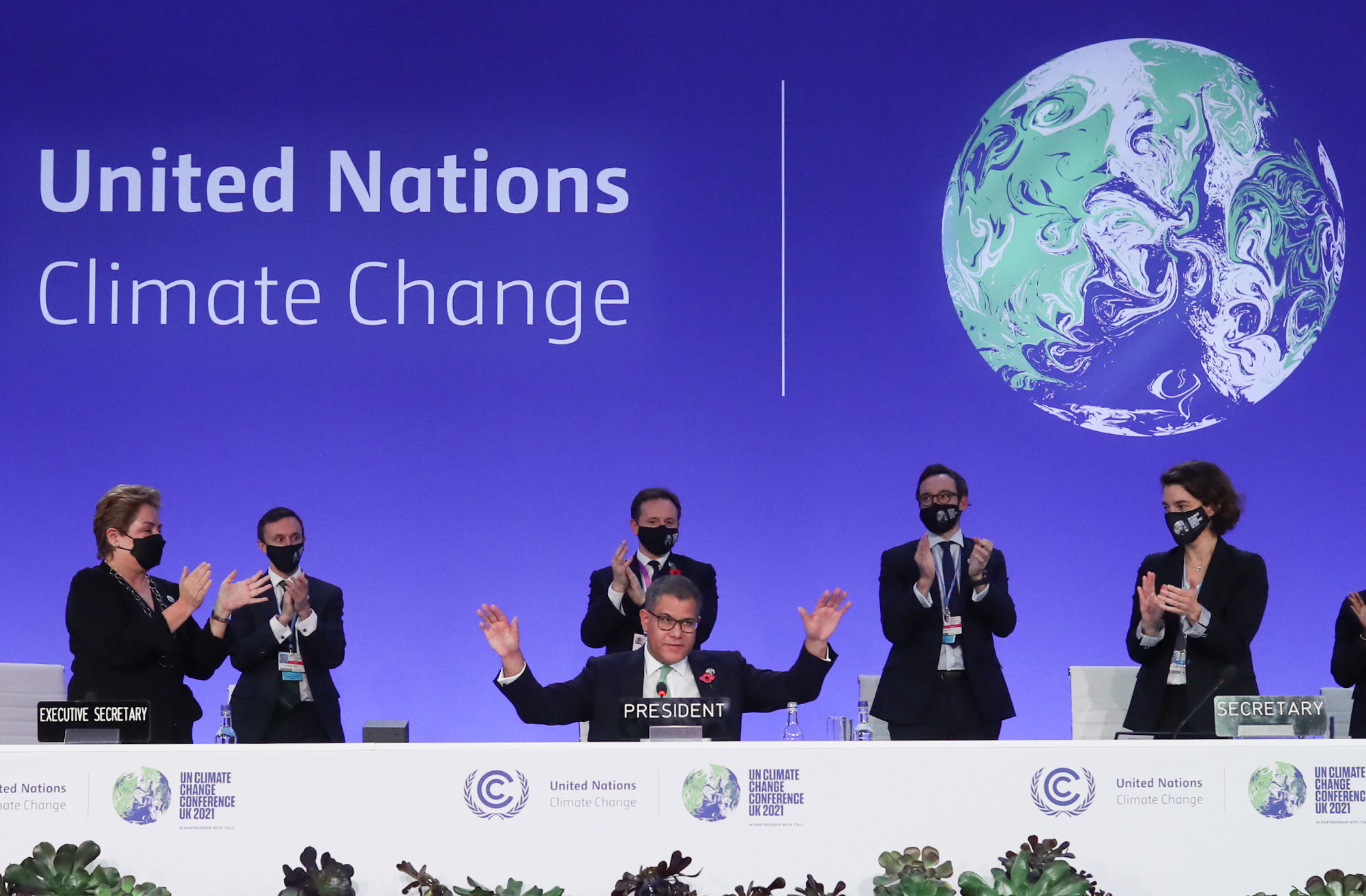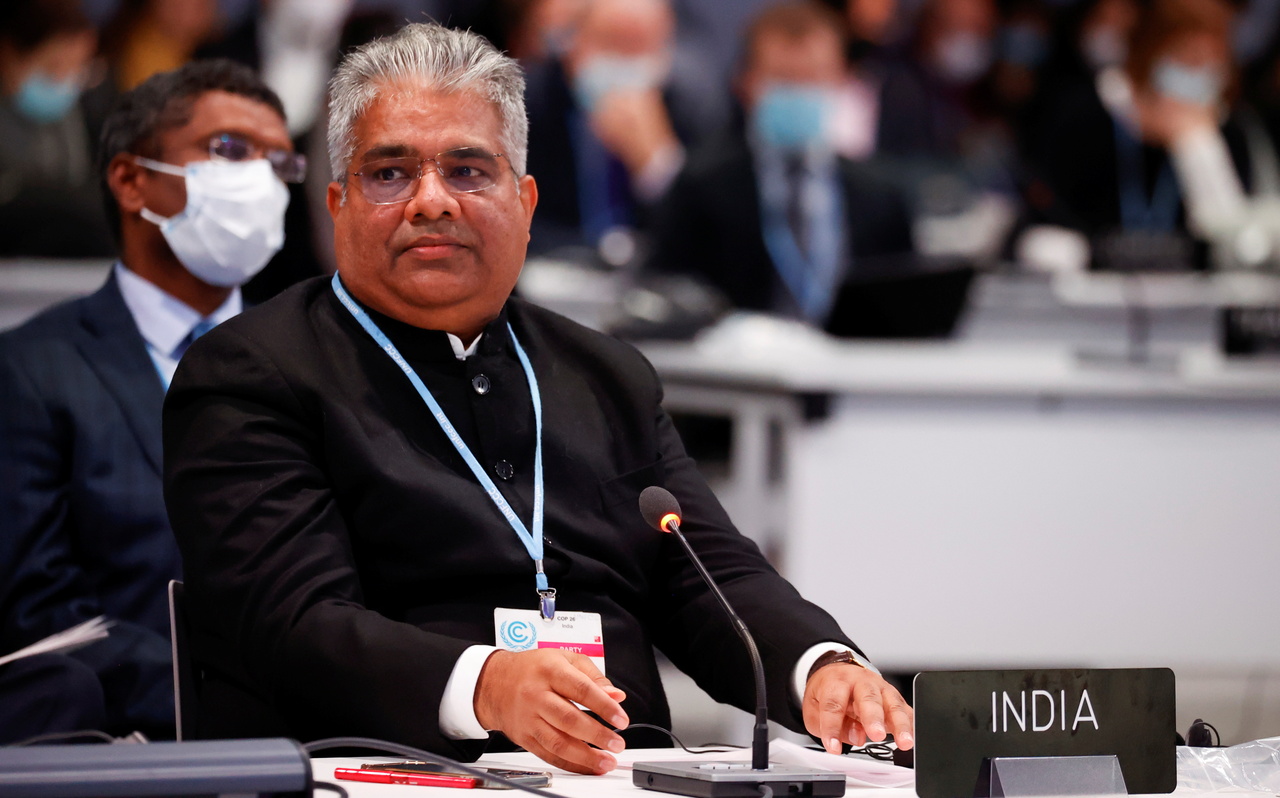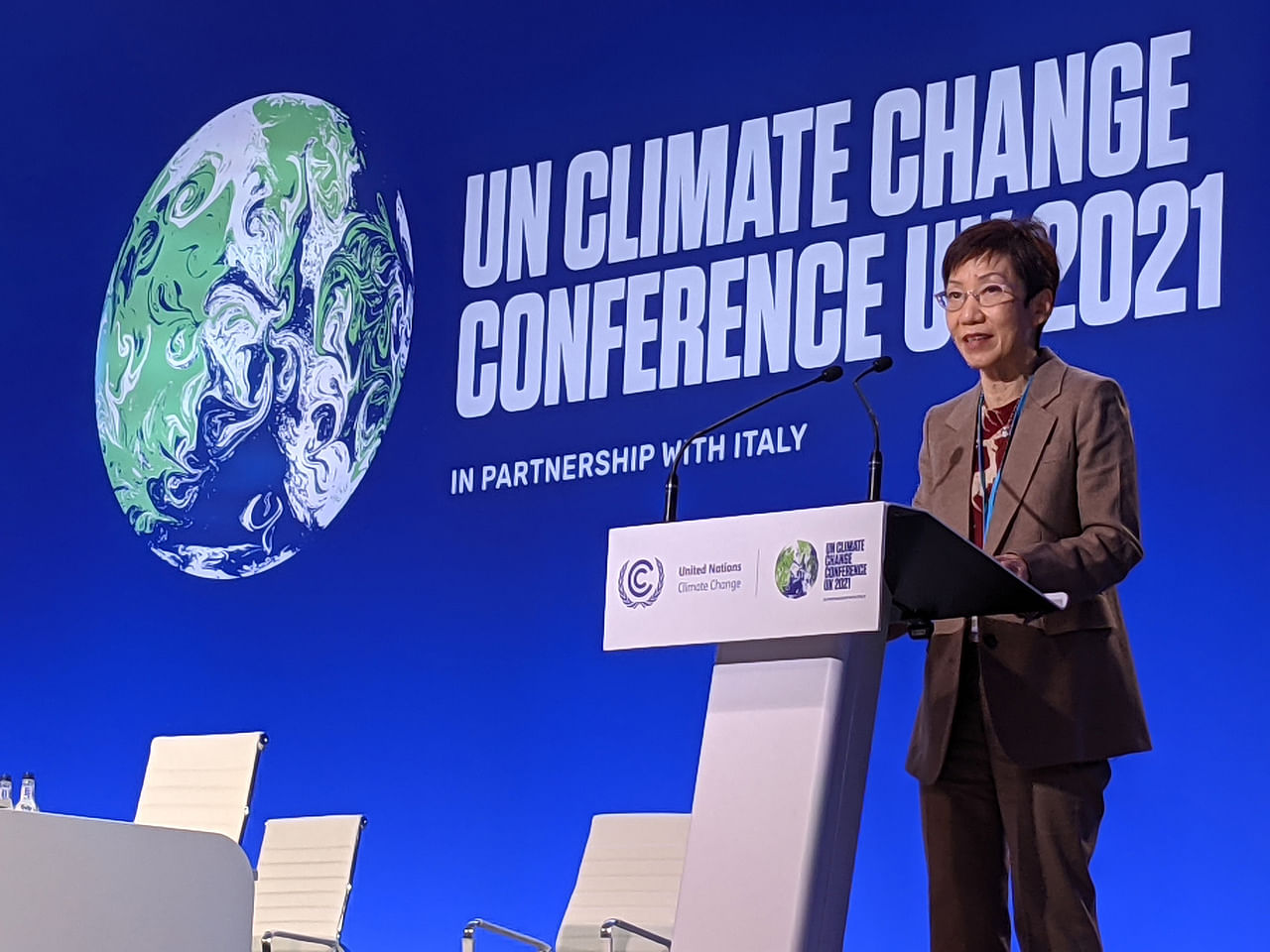Nearly 200 nations clinch ‘imperfect’ but vital climate deal at COP26
Sign up now: Get ST's newsletters delivered to your inbox

COP26 President Alok Sharma gestures as he receives applause during the UN COP26 in Glasgow on Nov 13, 2021.
PHOTO: REUTERS
GLASGOW - Nearly 200 nations agreed on a deal on Saturday (Nov 13) to step up efforts to avoid dangerous climate change, boost investments in green energy and speed up the shift away from coal.
But a last-minute intervention from India led to the language around coal being weakened, dampening the mood in the final plenary.
After two weeks of talks, which went more than a day into overtime, delegates from dozens of nations said they accepted the draft text package of decisions, though many - especially from vulnerable developing nations - were not happy with everything.
After nations reluctantly accepted India's revised text proposal, COP26 president Alok Sharma gavelled through the "Glasgow Climate Pact" to the cheers of hundreds of exhausted delegates in the plenary session.
The decisions agreed in Glasgow will bolster the 2015 Paris Agreement, the world's main climate treaty.
A key goal of the talks was to settle on a deal that will accelerate efforts to limit global warming to 1.5 deg C above pre-industrial levels. The world has already warmed 1.1 deg C and is suffering worsening climate impacts, including melting ice caps, coral reef bleaching and deadlier heatwaves and wildfires, with some impacts now irreversible for centuries to millennia, the United Nations said.
"Our fragile planet is hanging by a thread," UN Secretary-General Antonio Guterres said in a statement.
The approved texts were a compromise, he said. "They take important steps, but unfortunately the collective political will was not enough to overcome some deep contradictions."
Countries have now agreed to boost their emissions reduction plans, which is vital given current pledges put the world on a path warm 2.4 deg C, an analysis released during the talks showed.
A major source of disappointment was the lack of specifics on raising long-term climate finance for poorer nations and especially no formal decision to create a funding mechanism for loss and damage that many vulnerable countries, especially low-lying island nations had pressed hard for.
Important starting point
Delegates from many small island states gave impassioned speeches ahead of the pact's adoption saying the decision text was not perfect but it was an important starting point and that were was no time to waste because the threat from worse storms, floods and sea level rise is only growing.
"I am not willing to leave here with nothing. We have a text in front of us. It does not have everything that everyone wants, but it has extremely important elements that do serve the planet," said Marshall Islands climate envoy Tina Stege.
"It is not perfect. It is not without fault. We have much work to do. But it does represent real progress."
New Zealand's envoy said the text represented "the least worst outcome" but supported it.
He said after years of UN climate meetings, greenhouse gas emissions have kept rising.
"Talking about it hasn't solved the problem. And I don't believe that more talk will improve the package presented today."
China said the text was not perfect but acceptable, while India's environment and climate minister Bhupender Yadav proposed new wording for the final agreement in which nations should escalate the phasing down of unabated coal power instead of previous language to phase it out.
The request triggered expressions of disappointment from delegates in the final plenary session, who stressed that the world should be working hard to phase out coal, not phase it down, especially since coal is highly polluting.

India's Environment Minister Bhupender Yadav attends the UN COP26 in Glasgow on Nov 13, 2021.
PHOTO: X01988
Unabated coal means industrial plants, such as coal-fired power stations, that do not capture the carbon dioxide (CO2) they produce.
The text also called for the phase-out of inefficient fossil fuel subsidies while "recognising the need for support towards a just transition".
The focus now shifts to faster and stronger action to fight climate change.
The COP26 deal calls on all nations to boost the ambition of their national climate plans, calling on those that have not submitted new or updated plans to do so by next year.
It calls on nations to "revisit and strengthen" the 2030 targets in their nationally determined contributions (NDCs) to align them with the 1.5 deg C temperature goal by the end of next year.
It also requests the UN to annually assess all NDCs for ambition.
Suite of issues resolved
Crucially, COP26 resolved a long outstanding suite of issues relating to the Paris Agreement rulebook, which needed to be completed so that nations could fully implement the Paris treaty.
This included rules on the creation and oversight of carbon markets that could unlock billions of dollars of investments in emissions reductions projects, such as wind farms, energy efficiency investments or forest restoration schemes.
This highly contested area had been bogged down in technical discussions around ensuring any carbon offsets were genuine and not double claimed by a country and a company as part of their emissions reduction pledges.
Also resolved were rules on transparency of reporting of national climate plans to ensure all countries were on the same page and not backsliding, and a common timeframe for NDCs.
On the crucial issue of climate finance to developing nations, the text maintains an emphasis on rich nations meeting a pledge to provide US$100 billion (S$135 billion) in annual climate finance and notes with deep regret that the 2020 goal to meet this pledge has not been met.
Climate policy analysts and conservation groups gave qualified support for the COP26 deal.
Mr Ani Dasgupta, president and chief executive of Washington-based World Resources Institute, said progress made over the past year and at the COP26 summit offers a strong foundation to build upon but there was much more to do. "The real test now is whether countries accelerate their efforts and translate their commitments into action."
Greenpeace called the deal "meek and weak" with the 1.5 deg C goal only just alive. "But a signal has been sent that the era of coal is ending. And that matters," the group said in a statement.
Singapore's response
Ms Grace Fu, Minister for Sustainability and the Environment, told Singapore media that while the pact was not ideal, it was better than returning home with no deal.
Singapore stands in solidarity with the small island states, said Ms Fu.
The Alliance of Small Island States (Aosis), which Singapore is a member of, is asking for more funds to adapt to the impacts of climate change and as compensation for the losses and damages their economies and societies have had to deal with due to extreme weather events.

Minister for Sustainability and the Environment Grace Fu delivering Singapore’s National Statement at the UN COP26 on Nov 9, 2021.
PHOTO: MSE
Ms Fu noted that banks and businesses are more willing to fund mitigation projects - or projects that reduce a country's carbon footprint, such as a renewable energy plant.
But funds for adaptation efforts or projects that reduce the impacts of climate change, such as sea walls to protect against sea level rise, are less accessible, she said.
"We heard their plight, we have a lot of sympathy for that position. I would like to support them as much as possible," said Ms Fu.
"We have not reached the goal, but it's an issue that we'll continue to support our colleagues from Aosis to pursue in subsequent COPs."


